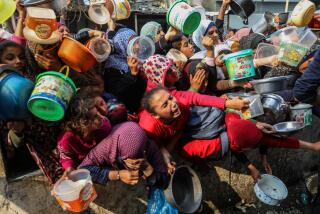Great Read: Help for Syria’s maimed falls tragically short
In the living room he helped build, Mahmood sat in a wooden chair, being scolded by his wife. The urine in his drainage bag had just spilled onto the freshly mopped floor.
“Why is it ripping each day?” Auroba asked sternly, exasperation creeping into her voice.
“What do I know?” he said quietly, slumped forward like a child in trouble. His patchy salt-and-pepper beard spoke of an uneven, hurried shave.
“What are you doing to it?” Auroba pressed, as she grabbed a bucket and handed it to him.
Mahmood took the bucket and placed the leaking bag inside without answering.
He’s surrounded by reminders of his former existence as a self-reliant man, a second-generation carpenter: coffee tables, a desk, an entertainment system, built with his own hands. Now, when the 50-year-old finishes his daily coffee, he wordlessly hands the cup to a family member, unable to lean forward even slightly to place it back on the coffee table.
A simple act of independence stolen by a sniper’s bullet.
Sometimes he wishes the man with the gun had finished him off. “There are moments when I want to kill myself,” he said.
::
In a conflict that has already killed more than 160,000 people, there is little time to dwell on the living, no matter their condition.
The war, now in its fourth year, has left an estimated 1.1 million Syrians injured, according to the opposition Syrian Network for Human Rights.
With resources exceedingly limited, especially in opposition-controlled areas, even amputees, the paralyzed and the otherwise maimed must, by and large, fend for themselves.
“I pray to God that if I get struck I will die immediately and not be injured,” said Fuad, a volunteer nurse at a field hospital in the opposition-held neighborhood of Bustan Qasir where Mahmood has his catheter changed. “After a while, everyone gets sick of you. The focus here is on life and death; if he’s alive, leave him.”
Even before the 2011 uprising, Syrian society was inhospitable to the disabled. They were most often stuck at home or begging in the streets. Many curbs are about a foot high, placing the rare wheelchair ramp at a dangerously steep angle.
The country also doesn’t have a strong tradition of physical therapy to help those injured regain a modicum of independence.
In spite of the injuries inflicted by the conflict, few nonprofits work in the field of rehabilitation; most humanitarian aid is directed at trauma care and helping orphans and widows.
Raed Masri is the manager of the year-old National Syrian Project for Prosthetic Limbs. The project, which builds prosthetics as well as offers physical therapy, has a clinic in Reyhanli, Turkey, and recently opened one in northern Syria. There are plans to open offices in Jordan and Lebanon as well.
“This is a constantly growing number,” Masri said of the need. “If we say there are 100 cases in Aleppo and then there is shelling today, there may be four more cases.”
::
It was early 2013, the height of a bread shortage in Aleppo, and Mahmood had gone out to buy a loaf. He had to walk about a mile until he found a bakery that was open, and then he stood in line for six hours.
As he was walking home, he suddenly felt a sharp prick in his back and collapsed in the middle of the street. He grabbed one of his legs and tried to lift it, but it fell lifelessly.
“You people, you citizens, I didn’t do anything!” he yelled at the faceless sniper as he lay in the empty street.
His screams drew worshipers from a nearby mosque. No one dared to venture into the street to pull him to safety; instead, they threw a rope and dragged him out of the sniper’s sights, further injuring his back.
He was taken to a private hospital in the government-controlled side of the city of Aleppo, but doctors refused to operate, saying he was permanently paralyzed from the waist down. They didn’t remove the bullet until weeks later, when he developed a high fever.
When he pressed about possible treatments, some doctors told him there was no hope while others assured him he would heal naturally. Some, well-meaning, advised him to rub olive oil on his back.
“If I had been killed it would have been better,” he said, tears falling from eyes with droopy lids and a permanent pleading look. “If a shell hit me, I’d say it’s OK, but not some son of a bitch to shoot me, and all for some bread.”
Over the months, Mahmood’s legs have begun to atrophy and twist to the right. Occasionally he grabs them and jerks them upright. He spends most of his days sitting on the couch, his legs stretched out in front of him but hidden under a blanket.
“I am embarrassed to ask anyone to carry me down,” Mahmood said of getting downstairs. “People don’t have time for me. I was someone who relied only on myself.”
Until recently, the family had been living in an empty, ground-floor doctor’s office. Although there was no shower and no electricity, he was happier there because he could roll himself out to the sidewalk in his wheelchair and sit for hours.
People suggest that he go to neighboring Turkey for surgery that might restore his ability to walk. But the family, which receives food aid and is struggling to pay about $33 a month for rent, can afford neither travel nor the surgery. There is also no guarantee such an operation would be successful.
::
Before one recent physical therapy appointment, Mahmood lay on the sofa as Auroba changed his diaper. With the help of her brother, Ziad, she dressed him in green sweat pants and black loafers.
“His spirits are low and he’s making my spirits low,” Auroba, 38, whispered as Ziad and a neighbor carried her husband downstairs to his wheelchair.
On his way to the clinic they avoided the damaged sidewalks and dodged the many craters from mortar rounds. A wall mural seemed to mock him: a man splayed out on his stomach, a bloody bullet wound in his back. Underneath was written, “Freedom is expensive.”
The clinic, which treats dozens of disabled patients each week, doesn’t have a wheelchair ramp, so Mahmood was carried up the stairs. As he waited for an injured rebel fighter to finish his treatment, Mahmood wheeled himself into the warm sunshine in the courtyard.
He has started to regain some feeling in his thighs and clings to the belief that the physical therapy will enable him to walk again, even as his therapist tells him the main focus is on preventing his leg muscles from atrophying further.
“Uncle, we’re going to fight today,” Amira Sandeh said, using a term of respect, as she bent his left leg toward his head and waited for Mahmood to push back against her hand. “You have to work. Come on, uncle, stronger.”
Sandeh placed a chair next to the examination table.
“By myself?” he said, looking up at her, eyes widened.
“You have to work,” she repeated, urging him to slowly lower himself onto the chair.
“I don’t want to do anything to injure myself more than I already am,” he said.
::
Mahmood worries about being abandoned by his family now that he isn’t a breadwinner and cannot care for himself. In patriarchal Syrian society, he feels like a dead weight.
His two daughters live on the government-controlled side of Aleppo, where one is a senior in high school and the other is studying environmental engineering at the university. His eldest son has a job delivering fuel for generators and his wife makes less than $7 a week folding undergarments at a clothing factory.
Mahmood didn’t want his last name published because he feared government retribution against his daughters.
“I mean, if she’s paying the rent, what if she leaves me? I need her now,” he said. “I try not to say anything to annoy her so she doesn’t leave me.”
The couple fight frequently now. He is often depressed, and she is overworked and stressed.
His friends and family worry that he wallows too much in self-pity and hasn’t accepted his disability. Rather than learn to cope with his paralysis, he focuses on nothing less than walking again.
“Half the country has become disabled,” Auroba said. “I see kids [on wheelchairs] in the street moving quickly. I may not always be here to take care of him, I could be killed tomorrow.”
“The bread is what killed me,” Mahmood said.
“Don’t say that. It’s fate,” she said, almost pleading.
“Everyone says, ‘This is fate, this is what God intended,’ but God is good,” he said. “It is our countrymen who are hideous.”
“I can’t listen to this blasphemy,” Auroba said, jumping up from the couch and leaving the room.
Mahmood stayed in his seat, watching his wife walk away.
More to Read
Start your day right
Sign up for Essential California for news, features and recommendations from the L.A. Times and beyond in your inbox six days a week.
You may occasionally receive promotional content from the Los Angeles Times.







